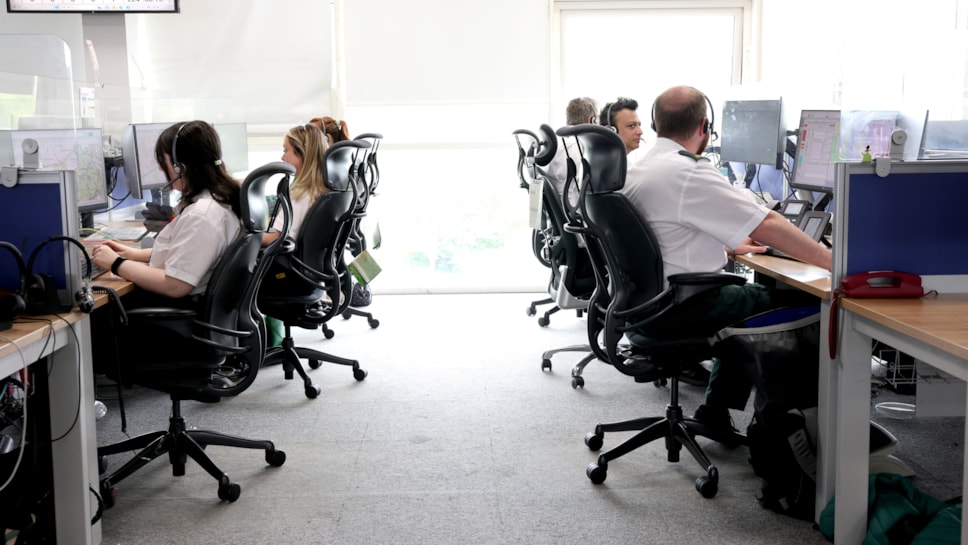
Behind the scenes: how NEAS’s emergency operations centre keeps the North East safe
"The EOC is the heartbeat of NEAS. It’s where logistics, clinical expertise, and decision-making come together to keep our communities safe. Every team member—from call handlers to dispatchers to clinicians—plays a vital role in delivering care efficiently and safely."
Covering 3,230 square miles across the North East and serving a population of 2.7 million people, our service operates at the heart of urgent care in the region. At the centre of it all is the emergency operations centre (EOC); ensuring patients receive the right care at the right time.
The EOC is split into three interlinked functions: call handling, dispatch, and the clinical assessment service (CAS). Together, they support our emergency care and patient transport services (PTS), helping the Trust respond quickly and safely to emergencies, manage patient journeys, and provide expert clinical advice.
Call handling
Every emergency response begins with a call. In 2024/25, NEAS health advisors answered:
- 999 calls: 413,370
- NHS 111 calls: 1,000,092
- Patient transport service booking calls: 253,904
Health advisors do more than answer calls, however. They triage patients, assess urgency, provide expert guidance, and take bookings for PTS journeys. They also support life-saving interventions: health advisors helped bystanders access 6,525 community defibrillators and guided over 1,800 callers through CPR – all done entirely blind and over the phone.
Chris Dawson is the service’s deputy operating officer and is responsible for the running of the EOC. He reflects: "The call handling team are the first point of contact for patients in some of the most critical moments of their lives. Their ability to assess risk, provide guidance, and stay calm under pressure is extraordinary. Every call is unique, and the decisions made in those first minutes can have a direct impact on patient outcomes."
Dispatch
Once a call is assessed, the Dispatch team coordinates the response. This includes allocating NEAS’s fleet - 139 double-crewed ambulances, 171 patient transport vehicles, 56 emergency response cars, and a variety of specialist support vehicles - to ensure patients get the right care on time.
Dispatchers manage the logistics of both emergency care and patient transport, balancing urgent 999 calls of varying degrees of severity and clinical need and scheduled PTS journeys, while monitoring key performance targets. In 2024/25, NEAS achieved a mean Category 1 response time of 6 minutes 41 seconds, ensuring care was delivered rapidly for life-threatening emergencies.
Chris adds: "Dispatch is a highly complex logistical operation. Teams are constantly balancing resources, routes, and priorities to make sure the right vehicle reaches the right patient at the right time. Behind every mean response time and performance target is a huge amount of decision-making and coordination, often under pressure. It’s a challenge that the Dispatch teams meet every single day."
Clinical assessment service (CAS)
Staffed by clinicians including paramedics, nurses, doctors, and pharmacists, the CAS provides expert clinical advice to both 999 and 111 callers. Their role is to support health advisors in triaging complex cases, delivering care over the phone when appropriate, and ensuring patients are directed to the most suitable pathway. CAS helps manage pressure across the system while maintaining high-quality clinical decision-making.
Chris reflects further: "CAS is a critical part of both the EOC and wider integrated care system, giving our teams the clinical support they need to make safe, effective decisions. The clinicians in CAS provide advice and guidance that can positively change the course of a patient’s care in real time. Their expertise, combined with the wider EOC operation, ensures that whether it’s a life-threatening emergency or a routine 111 call from a poorly patient, we are delivering the safest and most efficient care possible."
Critical care desk
The critical care dispatch team works within the emergency operations centre at Bernicia House and is made up of 16 specialist paramedics for critical care and six critical incident dispatchers.
At any one time, there will be one dispatcher and one specialist paramedic in the emergency operations centre and two additional specialist paramedics responding in the community, one in the north and one in the south of the region.
The dispatch-based team take full responsibility for dispatching and coordinating specialist resources to incidents, including water rescues, collapsed buildings, mountain rescues, helicopter deployments, hazardous environments, and deploying NEAS teams such as the Hazardous Area Response Team and specialist paramedics. They also request support from other agencies such as the Great North Air Ambulance Service, North East Immediate Care, RNLI, and the Coastguard.
Chris adds: "The critical care desk has added huge value to the way we respond to critical incidents. The specialist team has strengthened communication with key agencies and ensures we work closely together for the benefit of our patients. Having a clear clinical rationale for deploying specialist resources also means that patients receive the most appropriate support for their circumstances."
Coordinating care across the region
Together, the EOC teams manage thousands of incidents every day. In 2024/25 alone:
- 280,000 patients were taken to hospital
- 37,900 patients were treated and discharged over the phone
- 139,700 patients were treated and discharged at home
- 24,300 Category 1 serious incidents were responded to within seven minutes
Chris concludes: "The EOC is the heartbeat of NEAS and the North East's Urgent and Emergency Care system. It’s where logistics, clinical expertise, and decision-making come together to keep our communities safe. Every team member - from health advisors to dispatchers to clinicians - plays a vital role in delivering care efficiently and safely. It’s a complex, high-pressure environment, but the dedication and skill of our people ensure that patients in the North East get the best possible care, every day. I couldn’t be prouder of the work they do."




